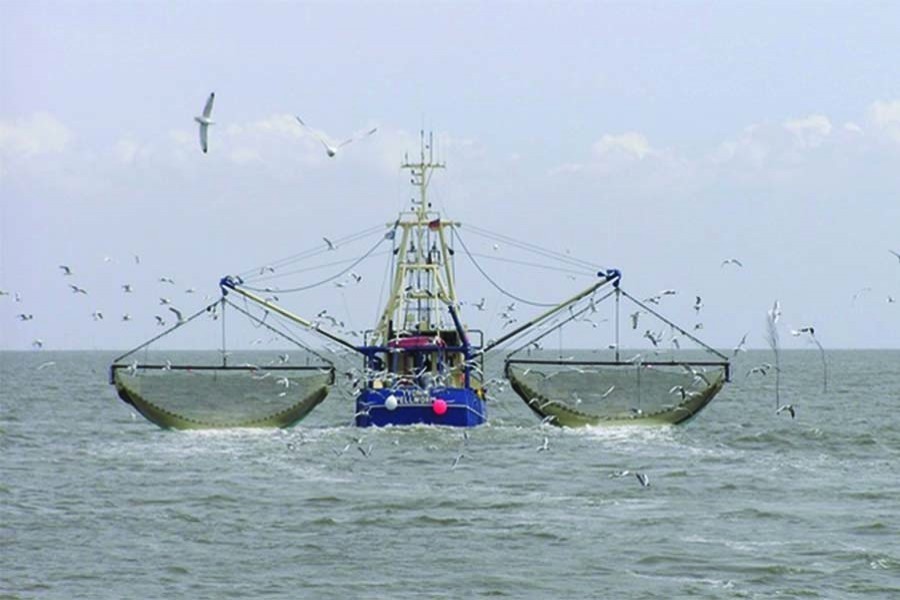The ocean contributes more than $6.0 billion annually to the Bangladesh economy and has the potential to generate much more. The gross value addition (GVA) of Bangladesh's ocean economy was $6.2 billion in fiscal 2014-15, accounting for 3.3 per cent of the country's total GVA. Ocean economy, popularly known as blue economy, offers opportunities in fishery, mineral resources, shipping and energy. Bangladesh has now the right to fish and explore resources within 118,813 square kilometres of the Bay of Bengal. This was established several years ago but the country is yet to tap the potential.
At present, mechanised boats and industrial trawlers can catch fish up to 70 kilometres from the shoreline out of the total of 660 kilometres available. The rest of the area remains untapped.
There is also scope for marine aquaculture, which is done in several countries, including China. Marine aquaculture is growing. Four years have passed since the nation won the case on maritime boundary at the international court. But the country's fishermen are yet to catch fish beyond the 100 kilometres of the sea. They are yet to utilise the scope to do marine aquaculture or mariculture.
Mariculture is a specialised branch of aquaculture involving the cultivation of marine organisms for food and other products in the open ocean, an enclosed section of the ocean, or in tanks, ponds or raceways filled with seawater.
It has become popular in countries such as India, Thailand, the Philippines, Malaysia and Indonesia. Mariculture needs to be introduced in Bangladesh. Marine fish accounted for 16 per cent of the total production of 4.34 million tonnes in fiscal 2017-18.
Ocean economy is one of the priority sectors of the government and it has taken a $240 million project with financing from the World Bank for sustainable development of coastal and marine fisheries. This is obviously good news for Bangladesh as the global lender is rendering its first-time support for exploring untapped potentials of the country. The WB has already begun work to help a survey in the sea and offshore areas under a technical assistance (TA) project. It is providing funds worth Tk 99 million for study on the offshore turfs for spotting the potential of the blue economy in the Bay of Bengal.
The WB consultants are expected to harness the potentials of the country's untapped blue economy in areas like fisheries, tourism, oil and other mineral resources. Thereafter, they will prepare a development project proposal (DPP) based on the survey results where the clear path of exploring potential resources in the Bay and their contribution to the macro-economy will be detailed out.
In 2012, the country got right over 118,813 square-kilometres of seawaters comprising territorial sea and an exclusive economic zone extending out to 200 nautical miles (370km). The arbitration in the international court concerned was for dispute resolution between Bangladesh and Myanmar over Bay ownership.
The same way, the verdict with India declared on July 07, 2014 also allowed Bangladesh's sovereign rights on all the living and mineral resources in the Continental Shelf extending up to 354 nautical miles from Chattogram coastal belt.
Also, the government is trying to woo local private sector businesses to invest in oil and gas exploration, especially in deep sea. It is also trying to find some other ways so that such exploration is found lucrative to all concerned. There is, however, a proposal that if someone wants to drill a well by investing some $150 million to $200 million, the government will take some stake in that bid to lower their risks.
In consideration of the geological structure of soil in the Bay, there are huge non-living resources inside Bangladesh maritime zone. Yet what is worrying is that the ocean appears to be at risk now, from marine pollution, and climate change.
Bangladesh needs to be further equipped in terms of policy, technological development, and capacities to tap the emerging opportunities in the blue economic regime. Concerned agencies should give high priority to building substantial marine science and technological capacity.
There is no denying that the synergy of ocean economy and global economic expansion is evolving by utilising sea-bed resources. It is opening diverse opportunities in the areas of renewable ocean energy, aquaculture, deep seabed explorations, marine biotechnology, seaports, shipping and coastal tourism.
Overcoming the challenges and sustainable development of marine resources holds the key to global economic growth. It is thus believed that Bangladesh will not cause any risk to marine resources. As of today, many nations are trying to solve over-fishing problem and preserve the oceans. It is expected that Bangladesh will also join such efforts.
Prime Minister Sheikh Hasina has recently expressed her resolve to turn the Bay of Bengal into a hub for sustainable economic development and detailed out her plan to harness the marine resources sustainably.
Development of ocean economy demands new partnerships among stakeholders within and across countries, regions, sub-regions, international agencies and the private sector to facilitate greater flows of expertise, finance, and capacity to effectively close the gap in sustainable management of both fisheries and non-living sea resources.
Partnerships and collaboration are needed at national level to steer a sustainable blue economy in the country by exploring its full potentials.


